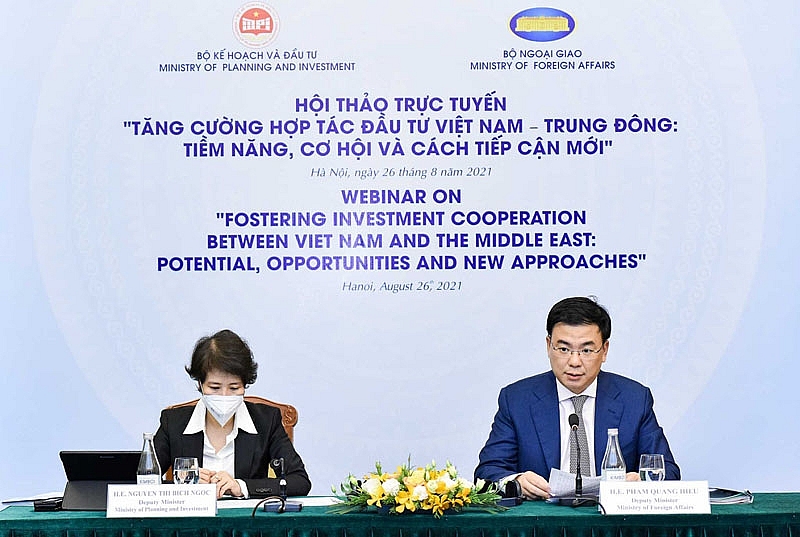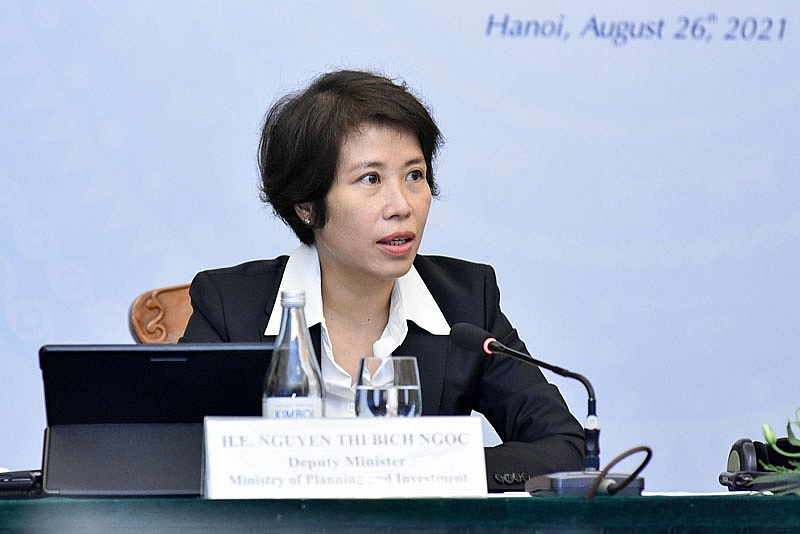Three breakthrough directions for investment between Vietnam and the Middle East
 |
| MoFA Deputy Minister Pham Quang Hieu and MPI Deputy Minister Nguyen Thi Bich Ngoc co-chairing the investment promotion webinar between Vietnam and Middle Eastern countries |
This was the first time the Ministry of Foreign Affairs (MoFA) and the Ministry of Planning and Investment (MPI) held an webinar investment webinar focusing on Middle Eastern countries, discussing their investment trends and policies, showing the potential of the Vietnamese market, as well as discussing options to enhance investment between the two sides.
The webinar welcomed over 300 participates, including representatives of 20 ministries, agencies, institutes, 20 diplomatic missions, and about 100 businesses, associations, funds, and local governments of Vietnam and Middle Eastern countries.
MoFA Deputy Minister Pham Quang Hieu highlighted Vietnam's ties with Middle Eastern countries. He also emphasised that in order to control the epidemic and restore the economy, Middle Eastern countries and Vietnam have adjusted their economic and investment policies, as well as promoted digital transformation to improve the economic capacity and competitiveness.
The webinar is the first step to facilitate investment from the Middle East into Vietnam. The deputy minister confirmed that the government is creating a favourable, transparent, and equal investment and business climate for all foreign investors, including Middle Eastern firms.
Meanwhile, MPI Deputy Minister Nguyen Thi Bich Ngoc, lauded the potential for cooperation betweeen the Middle East and Vietnam. She added that the two sides have already been noticing and realising some of this potential in past years, following the efforts of the two sides' diplomatic corps.
However, Ngoc said that investment into Vietnam is still modest, not reflecting the potential and capacity of the two sides. As of date, 13 of the 16 Middle Eastern countries have invested in Vietnam in 136 projects with $917.1 million in total capital, while Vietnam has 10 projects in the Middle East with $90.4 million in six countries.
 |
| MPI Deputy Minister Nguyen Thi Bich Ngoc |
At the webinar, representatives agreed that the Middle East has great potential not only when it comes to oil and gas but also in finance as well as science and technology with many prestigious and large public investment funds in the world.
In the context of the COVID-19 pandemic, Middle Eastern countries are accelerating economic diversification and foreign investment to achieve sustainable and green economic development associated with digital transformation. Some priority areas include resort tourism, green real estate, finance, clean energy (solar power and green hydrogen, among others), advanced technology, and smart agriculture, to name but a few.
This could complement Vietnam's strengths such as its favourable geographical position, being the gateway to Southeast Asia with a large market of nearly 100 million people. Vietnam has always maintained socio-political stability, dynamic economic development, and has been among the countries with the highest economic growth rates in the world in the past five years, Ngoc said.
Vietnam's integrating deeper into the global economy with participation in an extensive network of 17 free trade agreements (FTAs), including new-generation FTAs like the Comprehensive and Progressive Agreement for Trans-Pacific Partnership (CPTPP), EU-Vietnam FTA (EVFTA), and the Regional Comprehensive Economic Partnership (RCEP). Its business environment has seen tremendous improvements in transparency and simplification, creating more favourable conditions for foreign enterprises to do business and invest in Vietnam.
However, there remain some difficulties to Middle Eastern investment in Vietnam. The main issue is the lack of information and divergent business practices between the two sides, as well as agreements on investment promotion and protection between Vietnam and regional countries. Moreover, the COVID-19 has caused a lot of challenges to the operation and investment promotion activities of the two sides.
In order to create a breakthrough in cooperation and investment between Vietnam and the Middle East, Ngoc proposed three directions. Firstly, it is necessary to create favourable conditions for Vietnamese enterprises with strong potential to partner with Middle Eastern enterprises, as well as to work with third parties to jointly invest in large projects in Vietnam (similar to the cooperation model of the Nghi Son oil refinery).
Secondly, the two sides should build a cooperation mechanism to connect Vietnamese investment funds and financial institutions with Middle Eastern ones to invest in Vietnam's large infrastructure projects like transport, environmental, and industrial park infrastructure.
Thirdly, it is necessary to create favourable conditions for Middle Eastern enterprises to expand the import of food, agricultural products, fruits, and seafood, among others from Vietnam; encourage cooperation with Vietnamese enterprises to build supply chains (including the establishment of enterprises in Middle Eastern countries for the completion of final products to reduce costs) to act as focal points for exporting industrial, agricultural, and forestry products to the vast Gulf area and Middle Eastern countries.
What the stars mean:
★ Poor ★ ★ Promising ★★★ Good ★★★★ Very good ★★★★★ Exceptional
 Tag:
Tag:
Related Contents
Latest News
More News
- The PAN Group acquires $56 million in after-tax profit in 2025 (February 03, 2026 | 13:06)
- Young entrepreneurs community to accelerate admin reform (February 03, 2026 | 13:04)
- Spring Fair 2026 launches national fair series (January 30, 2026 | 16:17)
- SnP celebrates 10th anniversary with new brand identity (January 30, 2026 | 14:41)
- Sci-tech sector sees January revenue growth of 23 per cent (January 30, 2026 | 11:20)
- Vietnam–Singapore partnership strengthens board leadership (January 30, 2026 | 11:02)
- DIGI-TEXX expands footprint with new hub in Ho Chi Minh City (January 30, 2026 | 09:04)
- Vietnamese spend $2.1 billion on food delivery apps in 2025 (January 29, 2026 | 15:14)
- Japan's NTT DATA signs agreement with CMC Global (January 29, 2026 | 15:03)
- Japfa Vietnam hosts annual customer conference (January 29, 2026 | 12:07)



























 Mobile Version
Mobile Version